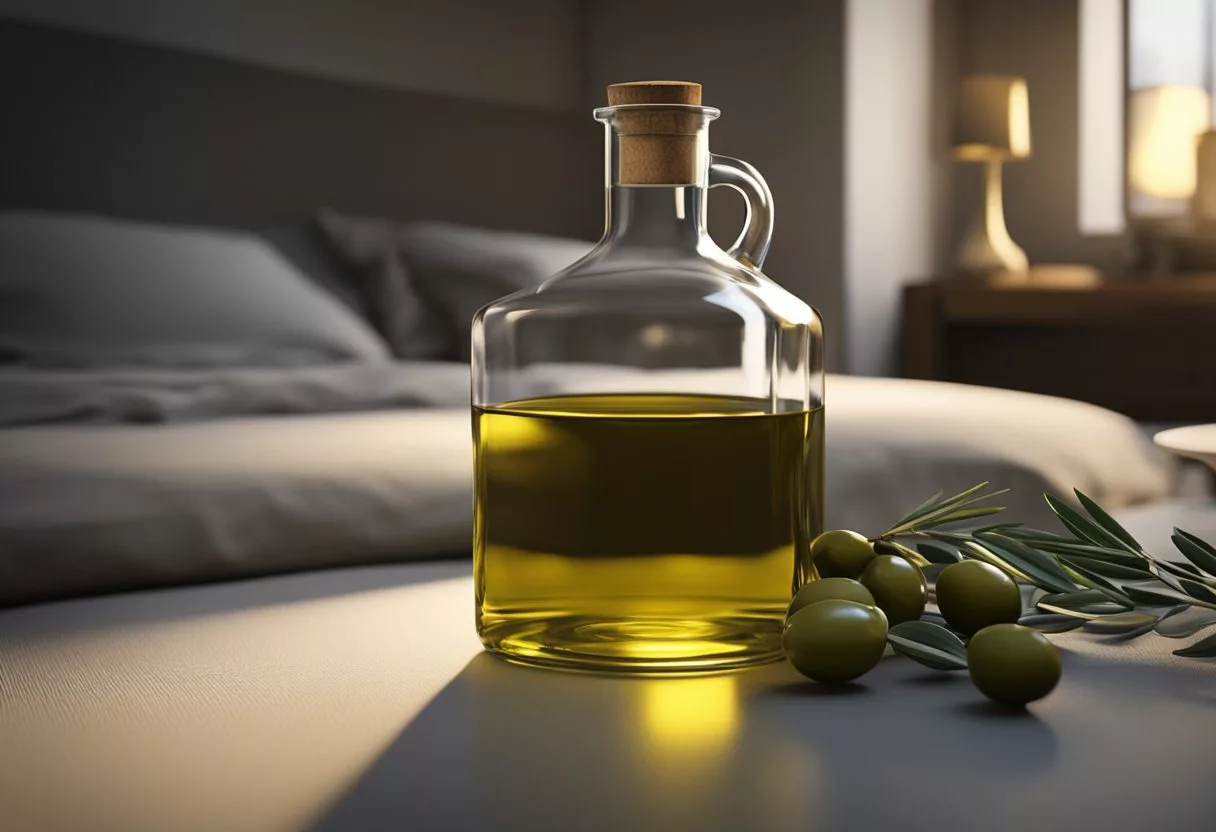Drinking olive oil every night before bed has sparked interest due to its potential health benefits. One key advantage is that olive oil promotes cardiovascular health, evidenced by numerous studies indicating its positive effect on heart health. Regular consumption may contribute to stabilizing blood sugar and even assist in weight loss, making it an intriguing addition to one’s nightly routine.
Olive oil is rich in monounsaturated fats, which are essential for maintaining healthy cholesterol levels. This beneficial fat content aids in controlling blood pressure and reducing the risk of heart diseases. Additionally, olive oil contains antioxidants, which can help fight inflammation and support overall well-being.
By incorporating just a spoonful of olive oil into your nightly regimen, you might experience significant health benefits. From enhancing heart health to aiding in weight management, the nightly intake of this liquid gold could be a simple yet effective way to boost your health.
Would you like to watch a video summary of this post? Here it is:
Key Takeaways
- Olive oil promotes cardiovascular health.
- Regular intake can stabilize blood sugar and aid weight management.
- Rich in monounsaturated fats and antioxidants.
What is Olive Oil?

Olive oil is a staple in many diets, known for its health benefits and culinary versatility. Key aspects include its types, nutritional profile, and how it’s extracted and produced.
Types of Olive Oil
Olive oil comes in various types, each with unique qualities. Extra virgin olive oil is considered the highest quality, made from pure, cold-pressed olives with no additives. It has a robust flavor and is rich in antioxidants and monounsaturated fats. Virgin olive oil is also made from pure olives but has a slightly higher acidity and less intense flavor. Refined olive oil undergoes processing to remove impurities and has a more neutral taste. Pomace olive oil is the lowest grade, made from the residues left after pressing.
Nutritional Profile
Olive oil is packed with healthy fats and essential nutrients. It contains a high amount of monounsaturated fat, primarily oleic acid, which is beneficial for heart health. It also has polyunsaturated fatty acids, including omega-3 and omega-6. These fats help reduce bad cholesterol levels and increase nutrient absorption. Olive oil is a source of vitamin E, an antioxidant that protects cells from damage. It also has small amounts of vitamin K, which aids in blood clotting and bone health.
Extraction and Production
The production of olive oil starts with harvesting and crushing olives to extract their oil. The best quality, extra virgin olive oil, is obtained through cold-pressing without chemicals. This method preserves the oil’s natural flavors and nutrients. Virgin olive oil is also cold-pressed but may come from slightly riper olives. Refined olive oil involves processing to remove flaws and bitterness, often using heat or chemical solvents. Pomace olive oil is produced from the leftover pulp after the initial pressing and may include refining agents. Each method affects the oil’s taste, nutrition, and quality.
Understanding these aspects of olive oil helps consumers make informed choices about their health and diet.
Health Benefits

Drinking olive oil before bed can provide several health benefits, including improved heart health, reduced inflammation, stable blood sugar levels, potential cancer prevention, weight management, and enhanced skin, hair, and bone health.
Cardiovascular Health
Olive oil is rich in monounsaturated fats, which are known to promote heart health. It contains oleic acid that helps lower bad cholesterol (LDL) and increase good cholesterol (HDL). The PREDIMED study found that adults who included olive oil in their diet experienced decreased risks of heart disease.
The oil’s polyphenols protect against cardiovascular issues by lowering blood pressure and preventing the oxidation of cholesterol, thus reducing plaque buildup in arteries. Regular consumption can also improve endothelial function, which supports healthier blood vessels.
Anti-Inflammatory Effects
Olive oil has powerful anti-inflammatory properties, largely due to its high content of oleocanthal. This compound acts similarly to ibuprofen, reducing inflammation and pain in the body. Chronic inflammation is linked to many diseases, including heart disease and cancer.
By consuming olive oil daily, such as before bed, individuals may alleviate symptoms associated with inflammatory conditions. This benefits those with arthritis or other chronic inflammatory diseases, offering a natural method to manage pain and inflammation.
Blood Sugar and Digestive Stability
Drinking olive oil can help stabilize blood sugar levels. It slows the absorption of glucose into the bloodstream, helping to prevent spikes in blood sugar.

Support healthy blood sugar levels, boost your all-day natural energy, and promote your sharp thinking with the help of BLOOD SUGAR FORMULA by Sugar Defender RESEARCH! A highly effective formula, proven to help support your healthy fat-burning metabolism for perfect blood sugar!
Olive oil also aids digestion by stimulating bile production and reducing gastric acid. This can ease symptoms of indigestion and promote smoother digestive processes, making it a beneficial nightly routine for overall gut health.
Cancer Prevention and Antioxidation
Olive oil contains potent antioxidants, including vitamin E and oleuropein, which combat oxidative stress and damage within the body. These antioxidants can help protect cells from mutations that may lead to cancer.
By regularly consuming olive oil, the body’s defense against free radicals strengthens, potentially lowering the risk of developing certain types of cancer. The oil’s anti-inflammatory properties also contribute, as chronic inflammation can create an environment conducive to cancer growth.
Weight Management
Despite being high in calories, olive oil can assist with weight management. It promotes feelings of fullness, reducing the likelihood of nighttime snacking. This can be particularly beneficial for those looking to manage their weight.
The monounsaturated fats in olive oil help to balance blood sugar levels, which can prevent cravings and overeating. Including olive oil in a daily diet can support healthy weight loss or maintenance.
Skin, Hair, and Bone Well-Being
Olive oil is beneficial for skin, hair, and bone health due to its high concentration of vitamins and nutrients. Vitamin E in olive oil helps maintain skin elasticity and hydration, reducing the appearance of wrinkles and promoting a healthy complexion.
For hair, the moisturizing properties of olive oil can prevent dryness and breakage, enhancing shine and strength. The polyphenols and oleic acid in olive oil also contribute to bone health by supporting calcium balance and improving bone mineral density over time. This can reduce the risk of osteoporosis and fractures as individuals age.
The Role of Olive Oil in Diets

Olive oil plays a significant part in various diets, notably in the Mediterranean diet, where it aids in promoting heart health and reducing inflammation.
The Mediterranean Diet
The Mediterranean diet emphasizes whole foods like fruits, vegetables, whole grains, and nuts. Olive oil is a primary fat source in this diet. Studies, like the 2013 PREDIMED study, found that this diet could significantly benefit cardiovascular health. Participants consumed several tablespoons of olive oil daily, leading to better heart health outcomes.
This diet also promotes sustainable eating habits by replacing saturated fats with healthy fats. Olive oil’s monounsaturated fats are linked to reducing “bad” LDL cholesterol levels while increasing “good” HDL cholesterol levels. This dietary pattern can help maintain a balanced lifestyle by including diverse nutrient-rich foods and healthy fats.
For more detailed information, you can explore this link.
Consumption Best Practices

When drinking olive oil every night before bed, it is important to consider how best to incorporate it into your routine. Focus on culinary uses, safe daily intake, and the optimal timing for getting the most benefits.
Culinary Uses
Olive oil can be enjoyed not just as a drink but also as an integral part of cooking. It can serve as a healthy fat for salad dressing, marinade, or even drizzled over cooked vegetables. Mixing it with lemon or herbs can improve its taste, making it easier to consume. Additionally, using extra virgin olive oil ensures higher nutrient content compared to standard olive oil.
Safe Daily Intake
Moderation is key when consuming olive oil. The recommended safe daily intake is usually around 1-2 tablespoons. This amount provides the necessary healthy fats without risking any adverse effects. Excessive intake might lead to unwanted calories and digestive issues. It is important to adjust the intake based on individual dietary needs and current health conditions.
Optimal Timing for Benefits
The best time to drink olive oil for maximum benefits is before bed. This practice may help stabilize blood sugar and promote cardiovascular health. Studies suggest that taking olive oil before sleeping can help you feel fuller, reducing nighttime hunger. Additionally, night consumption can aid in nutrient absorption and improve skin and hair health due to its rich content in Vitamins E and K.
Effects of Olive Oil Before Bed

Drinking olive oil before bed can impact sleep quality, aid digestion, and influence satiety and cravings. Understanding these effects can help you decide if this nightly habit fits into your health routine.
Impact on Sleep Quality
Consuming olive oil before bed may help some people sleep better. Olive oil is rich in healthy fats, which can keep you full and satisfied throughout the night. This can reduce the chance of waking up hungry, supporting uninterrupted sleep.
The fats in olive oil can also assist in stabilizing blood sugar levels. Stable blood sugar levels are linked to fewer nighttime awakenings and less insomnia. Moreover, the antioxidants in olive oil might support brain health, contributing to better overall sleep quality.
Digestive Processes During Sleep
Olive oil can positively affect digestive processes during sleep. It helps stimulate gastric acid production, which aids in breaking down food more efficiently. This can reduce the risk of digestive discomfort that might otherwise interrupt sleep.
Olive oil is known to promote bile production. Bile is crucial for digesting fats and absorbing nutrients. Drinking olive oil before bed might help minimize conditions like acid reflux, which can disrupt sleep patterns.
Olive Oil’s Role in Satiety and Cravings
One of the benefits of drinking olive oil before bed is its role in managing satiety and late-night cravings. Olive oil is high in monounsaturated fats, which are known to increase feelings of fullness.
By feeling more satisfied, you may find it easier to avoid unhealthy late-night snacks, maintaining better eating habits. This effect on satiety can also lead to improved weight management over time.
In addition to fats, olive oil contains compounds that may influence the hormones responsible for hunger and cravings. Balancing these hormones can help reduce the urge for nighttime eating, making it easier to achieve a healthy lifestyle.
Olive Oil’s Supporting Role in Disease Prevention

Drinking olive oil every night can play a significant role in reducing the risk of several chronic diseases. Its anti-inflammatory properties and heart health benefits make it especially valuable.
Heart Diseases and Stroke
Olive oil is rich in monounsaturated fats, which help lower bad cholesterol levels. This can reduce the risk of heart diseases and stroke. According to Harvard Health, consuming at least half a tablespoon of olive oil daily lowers the risk of heart disease by 14%.
Moreover, olive oil contains antioxidants that protect the heart by reducing inflammation. Studies show it can lower blood pressure, another risk factor for heart disease and stroke.
Diabetes Management
Olive oil may aid in managing type 2 diabetes. It helps stabilize blood sugar levels, making it beneficial for diabetic individuals. A study on showed it reduces blood sugar by 22% in healthy individuals.
Furthermore, the healthy fats in olive oil improve insulin sensitivity. This helps in better glucose control, reducing complications related to diabetes.
Role in Neurodegenerative Diseases
Regular consumption of olive oil is linked to a lower risk of neurodegenerative diseases like Alzheimer’s and Parkinson’s. Harvard Health reports that higher intake results in a 29% lower risk of dying from these diseases.
The antioxidants in olive oil, especially oleocanthal, help reduce oxidative stress and inflammation in the brain. This protects brain cells from damage, which is crucial for preventing neurological decline.
Arthritis and Pain Relief
Olive oil’s anti-inflammatory properties can also provide relief from arthritis and other pain-related conditions. It contains oleocanthal, a compound that works similarly to ibuprofen in reducing pain and inflammation.
People with rheumatoid arthritis, in particular, may benefit from incorporating olive oil into their diet. Regular consumption can lead to reduced joint pain and stiffness. Additionally, combining olive oil with omega-3 fatty acids may enhance its pain-relieving effects.
Comparing Olive Oil to Other Fats and Oils

Olive oil is often considered a healthy fat due to its high content of monounsaturated fats and antioxidants. Understanding how it compares to other oils can help in making more informed dietary choices.
Health Benefits of Olive Oil vs. Other Oils
Olive oil is rich in monounsaturated fats, which are linked to various health benefits. These fats can help reduce the risk of heart disease by lowering bad LDL cholesterol levels. Olive oil is also loaded with antioxidants that combat oxidative stress and may prevent cell death.
In contrast, seed oils like vegetable and canola oil contain a mix of saturated and unsaturated fats. These oils often have a higher amount of omega-6 fatty acids, which can lead to inflammation if consumed in excess. While they also contain healthy fats, they don’t offer the same level of heart-protective benefits as olive oil.
Studies have shown that extra virgin olive oil, in particular, is beneficial for lowering inflammation and promoting heart health. This type of olive oil has higher nutrient and antioxidant content compared to refined olive oils.
The Caloric Context
When comparing the caloric content, olive oil and other cooking oils are quite similar. One tablespoon of olive oil contains about 120 calories, similar to other oils like canola oil, which also has around 120 calories per tablespoon.
The key difference lies in the type of fats present. Olive oil is predominantly made up of monounsaturated fats, which are considered healthier because they can improve cholesterol levels. Seed oils, although similar in calories, often contain a higher proportion of polyunsaturated fats and omega-6 fatty acids.
Choosing olive oil over other oils can thus provide not only similar caloric intake but also added health benefits. The higher nutrient content and antioxidants in extra virgin olive oil make it a superior choice for those looking to maintain overall health.
Risks and Considerations

When drinking olive oil before bed, it is important to be aware of several potential risks and considerations. These include the possibility of allergies, the need to choose high-quality oils, and the impacts of consuming too much.
Potential for Allergies and Intolerance
Some individuals may experience allergies or intolerance to olive oil. Although rare, olive oil can cause allergic reactions such as skin rashes, hives, or even respiratory issues. People with known allergies to olives or other related plants should be cautious.
Intolerance to oleic acid, a primary component in olive oil, can lead to digestive discomfort. Symptoms might include bloating, nausea, or diarrhea. Monitoring reactions after consumption is important to ensure it suits one’s diet and overall health.
Quality and Purity Factors
Using high-quality olive oil is crucial. Extra virgin olive oil is minimally processed and retains more of its natural nutrients, like vitamin K and antioxidants. Refined olive oil, on the other hand, loses some beneficial properties through processing.
Choosing reputable brands that adhere to quality standards ensures the oil is pure and free from contaminants. Be aware of adulterated products that may contain other oils, reducing the nutritional benefits and potentially introducing unhealthy components.
Overconsumption Consequences
Overconsumption of olive oil can lead to unwanted effects. While it is healthy in moderation, consuming excessive amounts may cause weight gain due to its high-calorie content. Even though olive oil promotes cardiovascular health and might lead to healthier skin, balance is key.
Too much olive oil can also interfere with the digestive system, leading to stomach upset or changes in bowel habits. Incorporating it into a daily routine should involve small quantities to maintain the benefits without experiencing negative effects.
Frequently Asked Questions

Drinking olive oil before bed can affect weight loss, digestion, and overall health. The following questions address these topics in detail.
How does consuming olive oil before bedtime influence weight loss?
Consuming olive oil before bed may help you feel fuller, reducing nighttime snacking. Olive oil contains healthy fats, which can aid in controlling appetite and managing weight. Studies suggest that this practice can support those on a Mediterranean diet.
Are there health risks associated with nightly intake of olive and lemon juice?
Some people combine olive oil with lemon juice for added benefits. While this can aid digestion and detoxification, it may irritate those with sensitive stomachs. Always consult a healthcare professional before starting any new dietary regimen.
What are the potential benefits of taking olive oil at night for digestive issues?
Taking olive oil at night can promote better digestion. It may help relieve constipation and improve bowel movements due to its lubricating effect on the digestive tract. Olive oil also contains anti-inflammatory properties that can soothe the digestive system.
Can regular consumption of olive oil have negative side effects?
While olive oil has many health benefits, too much can lead to weight gain due to its high-calorie content. Additionally, excessive intake may cause gastrointestinal discomfort in some individuals. Moderation is key to enjoying its benefits without adverse effects.
What is the optimal timing for taking olive oil to maximize its health benefits?
For best results, consume olive oil right before bed. This timing may enhance satiety throughout the night, aiding in weight management. Additionally, taking it at night allows for better digestion as the body rests and recovers.
How soon can one expect to observe positive changes after incorporating olive oil into their nightly routine?
Positive changes can vary from person to person. Some may notice improvements in digestion or a decrease in late-night hunger within a few days. Other benefits, like improved skin or cardiovascular health, might take several weeks to become evident.
Can I drink olive oil in the morning for health effects?
Many people prefer to drink olive oil first thing in the morning on an empty stomach. This practice is believed to help jumpstart digestion and optimize the absorption of nutrients and antioxidants present in the oil. Drinking olive oil in the morning may also help with bowel regularity and provide a boost of healthy fats to start the day.